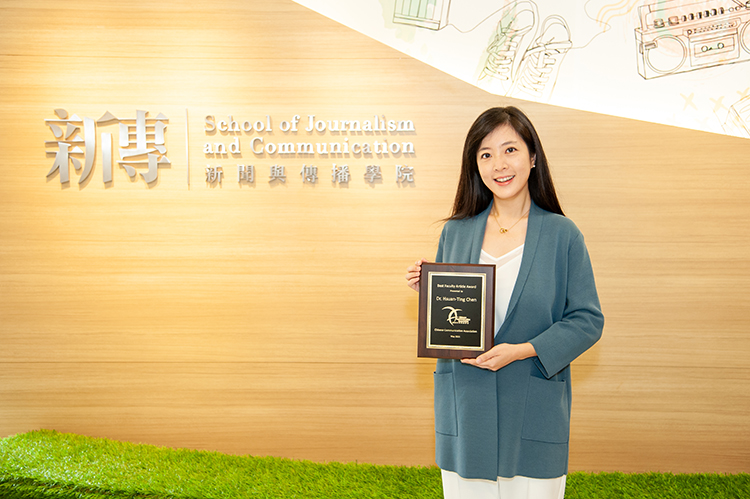陳萱庭教授獲頒國際中華傳播學會最佳教師論文獎。
陳萱庭教授的獲獎論文題為《網絡議程設置、黨派選擇性接觸和意見庫:與態度相似與相異的香港媒體效果》。這篇論文由陳萱庭教授與美國波士頓大學郭蕾教授及蘇超教授合著,發表於國際傳播學會(ICA)的旗艦期刊《傳播學刊》(Journal of Communication)。
在這篇論文中,陳教授與合作者檢視了不同媒體類型的媒介效果,考察了不同的媒體消費模式,區分了網絡議程設置對個人意見庫和反對意見庫的影響。該研究對網絡議程設置的相關研究做出了重要的理論貢獻。這篇論文在方法上亦有創新,引入了意見庫的概念並提出了更為準確測量相關議題的方法。以往研究者多在西方語境下探討此類主題,陳萱庭教授的研究則將其延伸至非西方語境。研究結果可以幫助我們理解香港的政治極化現象以及香港與中國大陸關係的政治氣候變遷。
目前陳萱庭、郭蕾和蘇超三位教授的合作仍在繼續,他們致力於運用計算方法研究政治傳播領域的相關議題。陳萱庭教授也建立了廣泛的合作網絡,她與香港本地及國際學者均有密切合作。陳教授同時也是路透新聞學機構數字新聞報導項目香港團隊的成員之一。
祝賀陳萱庭教授獲得國際中華傳播學會最佳教師論文獎!
Professor Chen Hsuan-ting Awarded CCA Best Faculty Article Award
Professor Chen Hsuan-ting was recently awarded the Best Faculty Article Award by the Chinese Communication Association (CCA) for her paper, “Network agenda setting, partisan selective exposure, and opinion repertoire: The effects of pro- and counter-attitudinal media in Hong Kong.” The paper is co-authored with Prof. Lei Guo and Prof. Chao Su of Boston University. It was published in Journal of Communication, which is the flagship journal of the International Communication Association (ICA).
Prof. Chen and her colleagues make a theoretical contribution to the literature on Network Agenda Setting (NAS) by examining the effects of different media types, considering the patterns of media consumption, and differentiating between NAS effects on one’s own opinion repertoire and the oppositional opinion repertoire (i.e., thoughts about how oppositional others perceive an issue). In terms of methodology, they introduce the idea of an opinion repertoire and develop a new method to measure how related various topics are. While much of the work on these theories has been done in Western contexts, they extend the research to a non-Western context. Prof. Chen and her colleagues found that different partisan media had different NAS effects on either one’s own or oppositional repertoire, depending on whether an individual engaged in partisan selective exposure or not. The findings provide important implications for understanding political polarization in Hong Kong and its political climate in terms of the relationship with the mainland.
Currently, Prof. Chen is continuing her collaboration with Prof. Guo and Prof. Su on this line of research to examine different issues and contexts by incorporating computational methods. She is also collaborating with Prof. Celine Song at Hong Kong Baptist University on the topics of vaccine hesitancy and incivility, and with Prof. Shuning Lu at North Dakota State University on a project of consumptive news feed curation. She is also part of the Hong Kong team for the Digital News Report published by the Reuters Institute for the Study of Journalism.
Congratulations to Ting!



 Follow
Follow